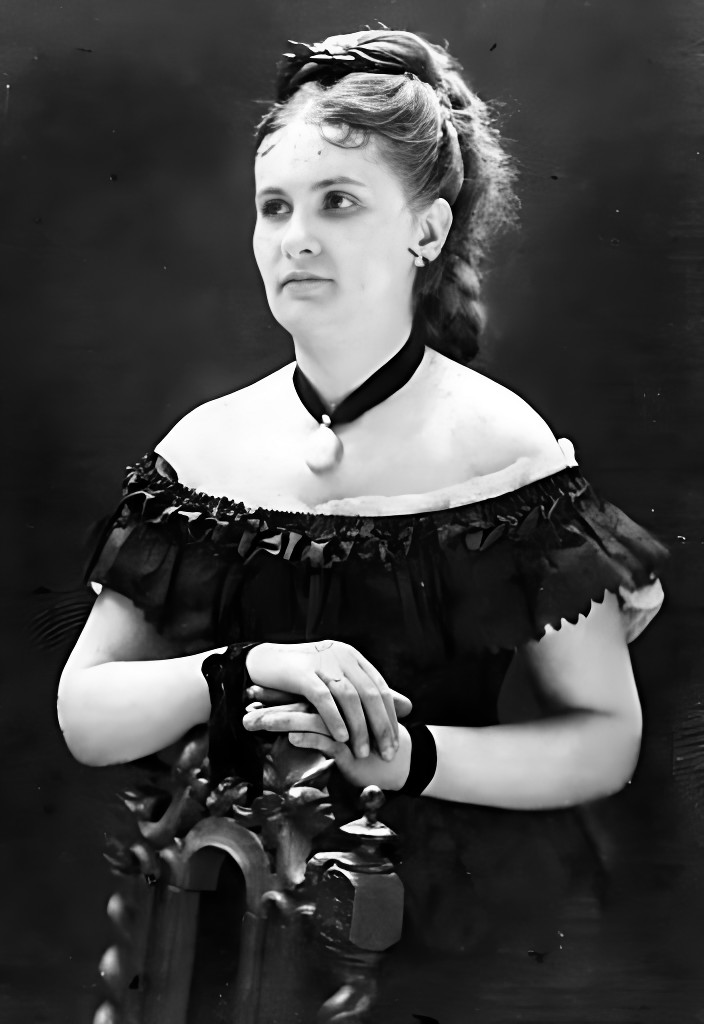Dolores Sucre y Lavayen (Guayaquil, November 1837 – Guayaquil, June 5, 1917) was a writer, poet, and a descendant of South American independence leader Antonio José de Sucre (1795-1830). In 1883, she recited her poems at the Centenary of the Liberator’s Birth and the inauguration of the statues of Simón Bolívar and Vicente Rocafuerte. On December 9, 1905, Ms. María Sánchez Urbina presented her with the Golden Lyre at the Olmedo Theater in Guayaquil, and the poet Numa Pompilio Llona dedicated a sonnet to her entitled “A Dolores Sucre,” to which Dolores modestly recited her poem “Mi Gratitud.” Her prolific literary work was published in Ecuador’s main newspapers and magazines, and she was admired in Peru by literary personalities such as Ricardo Palma, Carlos G. Amézaga, Teobaldo Corpancho, and Clorinda Mattos de Turner.
Family
She was born in November 1837 in the city of Guayaquil. Her parents were the Colonel José Ramón de Sucre y Alcalá (cousin of Antonio José de Sucre, aka, the “Grand Marshal of Ayacucho”) and the lady Mercedes Lavayen y García. The writer, Dr. César Borja Lavayen, was a second cousin of hers.
Friendship with Numa Pompilio Llona
In 1904, she was in charge of placing the golden crown of laurels on the temples of the poet Numa Pompilio Llona, and on that unforgettable night, before fulfilling her assignment, she recited a sonnet she’d composed for the special occasion.
On December 9, 1905, she received the “Golden Lyre” at Guayaquil’s Olmedo Theater, a tribute reserved for the city’s most extraordinary poets.
That night, the city’s most notable personalities gathered to honor the literary talent of a woman who’d been able to rise to such high levels despite the limitations and obstacles experienced by women at the time; and when, amid thunderous applause, Ms. María Sánchez Urbina placed the Lyre of Gold and Diamonds on the poetess’s chest, the poet laureate Llona was present, who dedicated a sonnet entitled “A Dolores Sucre,” which he’d written for the occasion.
Poems
Consejos a una señorita Aunque en rato de demencia Diga alguno que haces mal En la aguja y el dedal En cifrar todo tu ciencia Yo te aconsejo en conciencia, Con afecto y por deber, Que seas discreta mujer y hagas lo que al vulgo agrada Por ver tu dicha colmada A su mágico poder Que asombro al mundo daría Que aspiraran a tu mano Si en sonoro castellano Derramas luz y armonía; Pues los hombres a porfía Declaran sin corazón A la que halla inspiración En la pluma o los pinceles y le prodigan laureles A la que apunta un botón Te juro que eres tan linda Que si en espléndidas salas Te presentas con las galas Que la juventud te brinda, Nadie habrá que no se rinda A tu ingenio singular Si -de trajes al hablar- Dices con labio turbado: "Con mis manos he bordado mi vestido en mi telar" Al Ecuador Al verte que inconsciente y abatido como si no evocara tu memoria que tuviste, al nacer, nimbos de gloria, vas sin rumbo en tinieblas sumergido; mi ardiente corazón estremecido interroga a la musa de la Historia: "¿Será su decadencia transitoria? ¿surgirá vigoroso y redimido? Entonces ella, al penetrar mi anhelo, Rasga veloz de 10 futuro el velo.... y contemplo que -erguido entre naciones Que en mutua paz te rinden ovaciones por la extensión grandiosa de la Ciencia serena luz te lleva a la eminencia.
Selected works
- Poesías (Barcelona, 1914)
- Corona Fúnebre (1920)

